When a child is born with a hearing loss, they may hear some sounds but miss others. It is rare for children with hearing loss to hear nothing at all. Hearing loss could lead to delays in speech and language development and potential cognitive, behavioural and emotional problems.
Signs & symptoms of hearing loss in babies
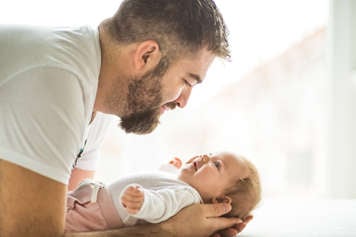
Birth to 4 months
- Your newborn does not startle at loud sounds
- As the weeks go by, your baby does not respond to your voice by doing things such as cooing or calming down
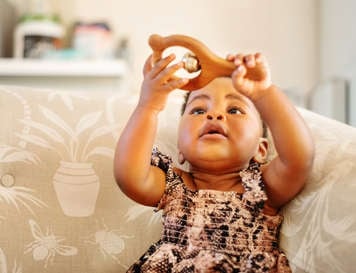
4 to 9 months
- Your baby does not smile at your voice when they cannot see you.
- Your baby does not turn their head toward familiar sounds.
- Your baby’s babbling may have decreased or stopped.
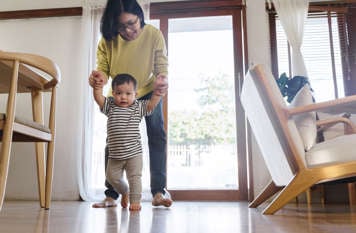
9 to 15 months
- Your baby is not babbling nor attempting to repeat simple sounds such as "baba" or "mama".
- Your baby does not use their voice to get your attention.
- Your baby does not respond to their name if they cannot see the person calling them.
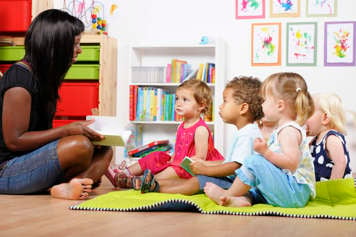
14 to 24 months
- Your child is not using many simple words and cannot point to body parts when asked.
- Your child cannot name common objects.
- Your child does not listen with interest to rhymes, songs, or stories.
- Your child cannot follow basic commands such as "come here" or "bring your toy".
Note: This is not a comprehensive list of signs and symptoms. Consult a health-care professional if you have any concerns about your child’s hearing.
Signs & symptoms of hearing loss in toddlers & preschool-age children
Your child:
- Has difficulty understanding what people are saying.
- Speaks differently than other children their age.
- Does not react when you call their name.
- Responds inappropriately to questions (misunderstands).
- Turns up the TV volume very high or sits very close to the TV to hear.
- Has speech or language delays or problems pronouncing sounds or words.
- Watches others in order to imitate their actions, at home or at preschool.
- Complains of ear pain, earaches, or noises.
- Cannot understand over the phone or switches ears frequently while talking on the phone.
- Says "what?" or "huh?" more often than other children.
- Watches the speaker's face very intently.
The Ontario Infant Hearing Program (IHP)
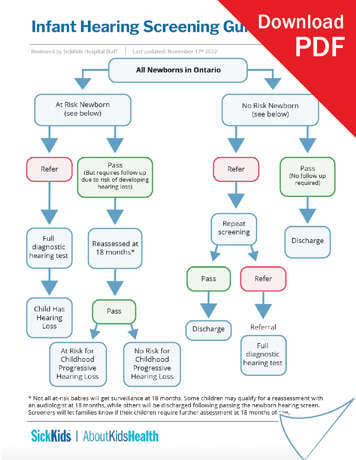
The Ontario Government provides hearing screenings for all newborns in hospital and community settings through the Infant Hearing Program (IHP).
All babies born in Ontario should have a hearing screening up to two months corrected age. This hearing screen is offered free of charge through the Ontario Infant Hearing Program. Hearing screening identifies infants who should have more in-depth testing for hearing loss as early as possible. Children identified with hearing loss receive audiology services at no charge at Infant Hearing Program (IHP) sites across Ontario.
Most often, this screening is done before your baby is discharged from their birth hospital. If your baby was not screened after birth in a hospital, or if they need a follow-up test, they will be scheduled into a Community Screening Clinic before 2 months of age (corrected age if born prematurely).
The newborn screening is quick and provides immediate results. This chart provides an overview of the Infant Hearing Screening protocol for babies born in Ontario.
Identifying children at risk for permanent hearing loss
Hearing screeners conduct a risk assessment at the time of the hearing screening. Families are also offered a risk factor screening to look for additional risks which may not be obvious in the newborn period. The dry blood spot screen is performed by Newborn Screening Ontario using the same sample collected by the hospital or midwife (heel prick test) and can detect:
- Congenital cytomegalovirus infection, which is associated with progressive hearing loss in childhood as well as other medical implications, and
- Several common genes associated with permanent hearing loss at birth or in early childhood.
The Infant Hearing Program also accepts referrals when a risk indicator is identified after the hearing screen has been completed. Please see the resources section below to contact your local Infant Hearing Program for information about risk factors for permanent hearing loss.
What if you miss your baby’s hearing screening?
If your baby did not receive a newborn hearing screen and they are older than 2 months of age, talk to your primary care provider. They can assist by referring you to a local audiology clinic that tests babies in order to have your baby’s hearing assessed.